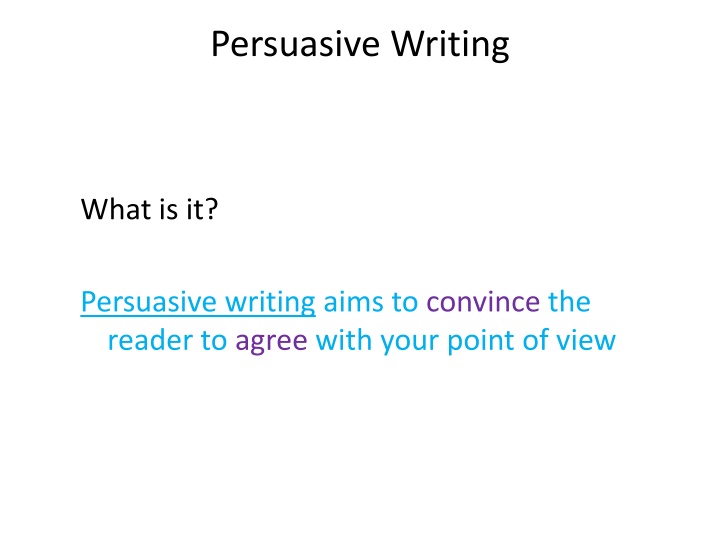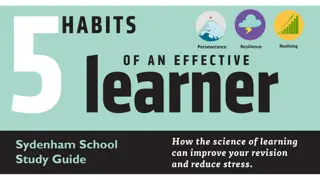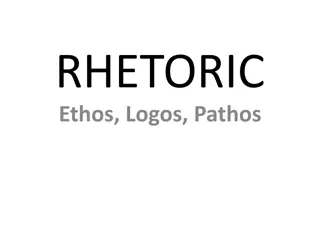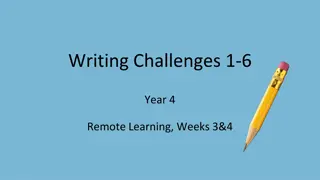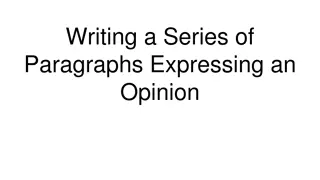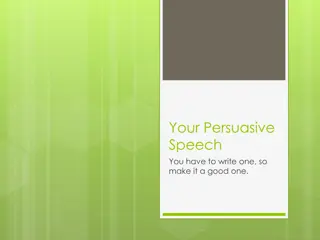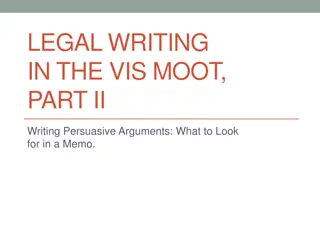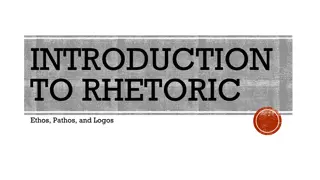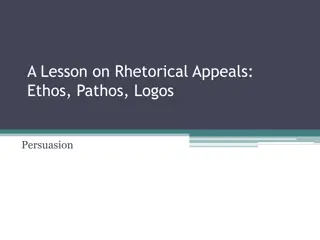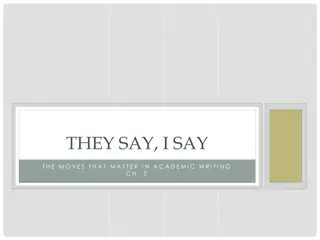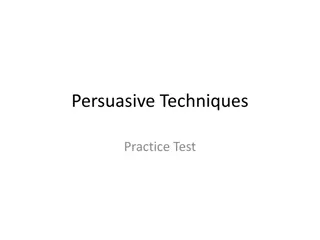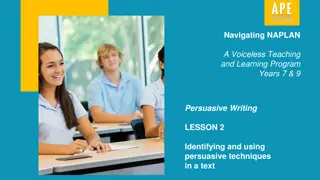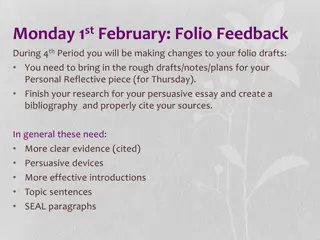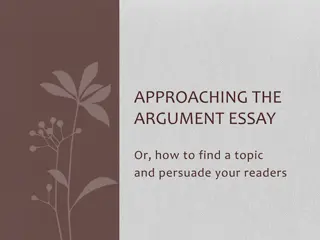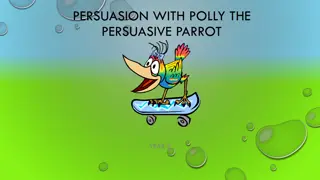Master the Art of Persuasive Writing
Persuasive writing aims to sway the reader's perspective by presenting convincing arguments. Learn how to structure your writing effectively, use persuasive techniques, and craft compelling introductions to successfully persuade your audience.
Download Presentation

Please find below an Image/Link to download the presentation.
The content on the website is provided AS IS for your information and personal use only. It may not be sold, licensed, or shared on other websites without obtaining consent from the author.If you encounter any issues during the download, it is possible that the publisher has removed the file from their server.
You are allowed to download the files provided on this website for personal or commercial use, subject to the condition that they are used lawfully. All files are the property of their respective owners.
The content on the website is provided AS IS for your information and personal use only. It may not be sold, licensed, or shared on other websites without obtaining consent from the author.
E N D
Presentation Transcript
Persuasive Writing What is it? Persuasive writing aims to convince the reader to agree with your point of view
When you read the prompt, you will usually be asked, Do you agree? Therefore, your first step is to choose a side. It may be helpful to turn the prompt statement into a question and then try to answer either: Yes, because (reason 1, reason 2, reason 3) -or- No, because (reason 1, reason 2, reason 3) These reasons will later become your paragraphs
Structure Introduction Give a brief background to the topic state your contention (whether you agree or disagree) Topic sentence (this motivates a reader to want to read more) Explain your topic sentence Example/evidence/expand - Link Second argument First argument Third argument Conclusion Restate your contention, wrap up the argument, maybe add an inclusive statement like If we allow animals to or It is up to us to make a stand to show future generations
Persuasive Techniques Rhetorical questions ( Why has this situation been allowed to continue? ) Appeals to emotions such as fear; nationalistic pride; the hip pocket( This will be bad for our economy. ) Emotive language (synonyms/antonyms) I felt upset and Personal anecdote When I was I witnessed Exaggeration/repetition I have seen this happen many times or cumulation This job will require determination, grit, strength and willpower. Generalisations There are hundreds of people who agree Inclusive language We/All/The whole society/Our community will be affected. Alliteration where the first letter is repeated The man in charge is cold, cruel and calculating. Expert opinions, facts, statistics
Introduction Title: BOOKS ARE BETTER THAN TV. Reading books is far more fun than watching tv. When you read a book, you use much more of your imagination. Books are also portable, you don t have to be near a power point and you can read a book at your own pace.
Introduction States your contention (what you think about the topic) Title: BOOKS ARE BETTER THAN TV. Reading books is far more fun than watching tv. When you read a book, you use much more of your imagination. Books are also portable, you don t have to be near a power point and you can read a book at your own pace. Outlines your reasons
First Argument (Paragraph 1) When you are reading a book you can imagine the places and characters as you wish. When you imagine the strong hero described in a book, another person could be visualizing a completely different person. Everyone has read a book and then seen the movie only to be let down. For example, when I saw the movie of Harry Potter on tv, I was disappointed to find that Hogwarts was not how I imagined it. Books allow you to create your own picture of a story, whereas how can you do this when watching tv?
First Argument (Paragraph 1) generalisation When you are reading a book you can imagine the places and characters as you wish. When you imagine the strong hero described in a book, another person could be visualizing a completely different person. Everyone has read a book and then seen the movie only to be let down. For example, when I saw the movie of Harry Potter on tv, I was disappointed to find that Hogwarts was not how I imagined it. Books allow you to create your own picture of a story, whereas how can you do this when watching tv? fdjkjaskl Personal anecdote Rhetorical question
Second Argument (Paragraph 2) You can read a book anywhere. I feel upset when I see someone inside on a sunny day watching tv. They are in a dark, airless room, when I can be outside, under a tree, engrossed in a story. It s far easier to pack a book when you go to the beach or travel than lug an enormous, heavy tv. We should all turn off our televisions more often and experience the joy of reading out in the open.
Second Argument (Paragraph 2) EMOTIONAL APPEAL TOPIC SENTENCE You can read a book anywhere. I feel upset when I see someone inside on a sunny day watching tv. They are in a dark, airless room, when I can be outside, under a tree, engrossed in a story. It s far easier to pack a book when you go to the beach or travel than lug an enormous, heavy tv. We should all turn off our televisions more often and experience the joy of reading out in the open. Powerful adjectives & verbs generalisation
Third Argument (paragraph 3) When you are reading a book, you are in control of your experience. You can have a break when you want to and you can re-read a section if you miss something. Imagine how terrible it would be if you were watching your favourite show on tv and you have to go to the bathroom. You come back only to realize that you have missed a crucial part of the story. How would you ever know what had happened? This would never occur when reading a book.
Third Argument (paragraph 3) When you are reading a book, you are in control of your experience. You can have a break when you want to and you can re-read a section if you miss something. Imagine how terrible it would be if you were watching your favourite show on tv and you have to go to the bathroom. You come back only to realize that you have missed a crucial part of the story. How would you ever know what had happened? This would never occur when reading a book. Appeals to fear Exaggeration Rhetorical question
Conclusion Reading a book is a far better experience than watching tv. It s an opportunity for you to exercise your brain and use your imagination. Not only can you choose where you read, you can pick up and put down a book whenever you want. It is up to us to encourage everyone to turn off their tvs and open a book.
Restates your contention (point) Conclusion Reading a book is a far better experience than watching tv. It s an opportunity for you to exercise your brain and use your imagination. Not only can you choose where you read, you can pick up and put down a book whenever you want. It is up to us to encourage everyone to turn off their tvs and open a book. Inclusive statement Wraps up the argument
Topics There is nothing social about social media Texting is killing off the English language There is more to sport than just fun and games Vampires are as real as Santa Claus Teachers are essential for learning
USE THE ESSAY WRITING GUIDE! FIND THIS ON THE NAVIGATION BAR IN RESOURCES SKILLS BUILDER. DON T FORGET TO Proofread Check grammar and spelling Check written expression read your work out loud Check vocabulary
